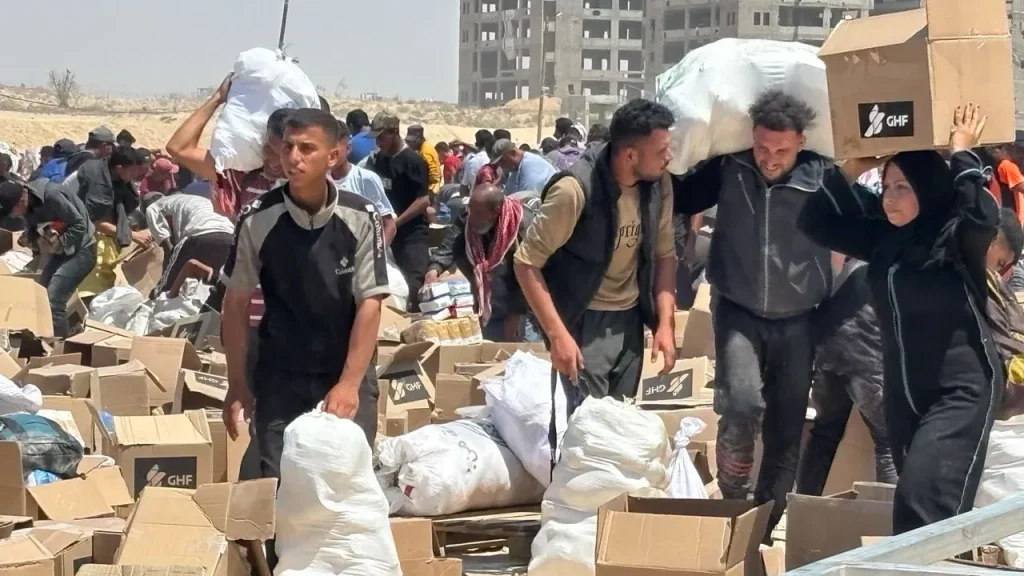The Gaza Humanitarian Foundation (GHF) has found itself at the center of controversy following its efforts to deliver aid to the residents of Gaza. Supported by both U.S. and Israeli interests, the foundation’s operations have been marred by violent incidents near its distribution sites and criticisms from various international agencies. As tensions rise, the complexities surrounding aid distribution in the region prompt urgent calls for reassessment and greater oversight.
| Article Subheadings |
|---|
| 1) Background of the Gaza Humanitarian Foundation |
| 2) Recent Violence and Security Concerns |
| 3) Criticism from International Bodies |
| 4) Statements and Responses from Officials |
| 5) The Future of Aid Distribution in Gaza |
Background of the Gaza Humanitarian Foundation
The Gaza Humanitarian Foundation (GHF) emerged as a U.S. and Israeli-backed initiative aimed at providing crucial assistance to the people of Gaza. Formatted to counteract the perceived deficiencies in prior aid mechanisms, GHF aims to facilitate the direct delivery of aid without benefiting the governing authority, Hamas. When GHF began operations last month, it was hailed by supporters as a new pathway for aid distribution, distancing itself from organizations historically criticized for allowing Hamas to profit from humanitarian assistance.
Recent Violence and Security Concerns
Despite its noble objectives, GHF’s efforts have been increasingly complicated by violent incidents reported near its distribution sites. Recent accounts indicate that Israeli Defense Forces (IDF) were compelled to take action in response to individuals disobeying their orders near these sites. Official statements reveal that troops shot at “suspects” when their commands went unheeded, casting a shadow over GHF’s operations and raising significant concerns about the safety of aid workers and recipients alike. The organization briefly halted food distribution as a precautionary measure, citing security challenges and a need to enhance safety protocols. This tumultuous atmosphere of violence has left many questioning the viability of conducting humanitarian efforts in such a charged environment.
Criticism from International Bodies
The situation has attracted sharp criticism from international bodies, particularly the United Nations. U.N. Under-Secretary-General for Humanitarian Affairs and Emergency Relief Coordinator, Tom Fletcher, has vocally opposed GHF’s intervention in Gaza, advocating for U.N. agencies to manage humanitarian responses. Fletcher’s contrasting views have highlighted the operational challenges posed by alternative aid groups and the potential risks associated with diverting aid to longitudinal conflict dynamics in the region. He has emphasized that GHF’s operations could enable others, such as Hamas, to exploit humanitarian crises for their political advantage.
Statements and Responses from Officials
Israeli officials have sought to counter the U.N.’s criticisms by asserting that GHF operates under stringent guidelines to minimize any aid diversion towards Hamas. Israeli Foreign Affairs spokesperson Oren Marmorstein has leveled accusations against Hamas itself, claiming that the terror group is actively attempting to sabotage GHF operations by spreading misinformation regarding its activities. Marmorstein articulated that there is a palpable concern among Hamas leaders alleging that successful aid delivery by GHF could substantially weaken their control over the Gaza population.
In a related context, the U.S. has defended GHF amidst criticisms, with Chargé d’Affaires, Dorothy Shea, condemning the U.N. resolution that called for an immediate ceasefire, arguing that it failed to recognize previous flaws in aid distribution frameworks. Shea’s stance underscores the complex interplay of politics and humanitarian relief in the region, as she asserted that aid distributions were historically managed ineffectively.
The Future of Aid Distribution in Gaza
As GHF reassesses its operational strategies in response to ongoing violence and criticisms, the future of humanitarian relief in Gaza remains uncertain. The foundation temporarily paused its distribution efforts last week due to safety concerns, signaling a need for improved security measures. Plans are in place for a gradual resumption of aid, yet operational efficacy will depend greatly on the security environment, political dynamics, and international backing.
The nuances surrounding GHF’s autonomy over aid distribution continue to reveal broader challenges inherent in humanitarian efforts within conflict regions. Advocates emphasize the necessity for strategic dialogues between international entities and governments to delineate responsibilities, ensuring the most effective outreach to civilians in need while safeguarding against the manipulation of humanitarian assistance by political actors.
| No. | Key Points |
|---|---|
| 1 | The Gaza Humanitarian Foundation operates as a U.S. and Israeli-backed initiative. |
| 2 | GHF’s operations have been marred by violence and security incidents. |
| 3 | Major criticisms have come from the U.N., particularly regarding aid distribution management. |
| 4 | Israeli officials defend GHF, accusing Hamas of disseminating false information. |
| 5 | The future of aid distribution in Gaza hinges on political dynamics and security concerns. |
Summary
The controversy surrounding the Gaza Humanitarian Foundation underscores the multifaceted challenges of delivering humanitarian assistance in conflict zones. As the organization navigates violent incidents and international scrutiny, the real implications of its operations may reshape the landscape of aid distribution in Gaza. Continuous dialogues and strategic partnerships are essential to establish a framework that respects humanitarian mandates while ensuring that aid reaches those in need without being compromised by political agendas.
Frequently Asked Questions
Question: What is the Gaza Humanitarian Foundation (GHF)?
GHF is a U.S. and Israeli-backed initiative focused on delivering humanitarian aid directly to the residents of Gaza, aiming to avoid benefiting the governing authority, Hamas.
Question: Why has the GHF faced criticism?
Critics, especially from the U.N., argue that GHF’s involvement may complicate the already challenging humanitarian situation in Gaza and allow adversarial groups like Hamas to exploit aid efforts.
Question: What are the implications of the recent U.S. veto at the U.N.?
The veto prevented the passage of a resolution for an immediate ceasefire, illustrating the complex interplay between geopolitical interests and humanitarian aid in the region. The U.S. has emphasized the need for changes in the aid delivery framework to prevent benefits to Hamas.
